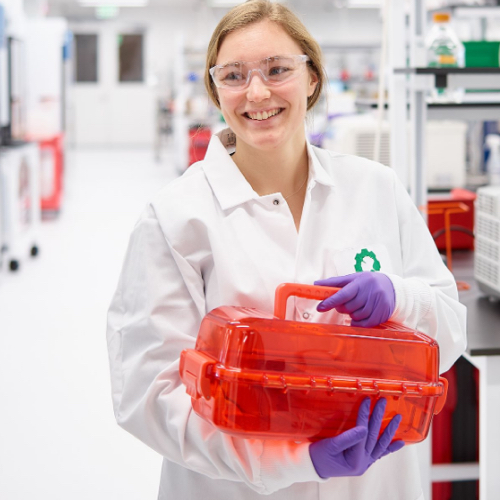IARPA B24IC Research Contract
We’re pleased to announce that we’ve been awarded a research contract from the Intelligence Advanced Research Projects Activity (IARPA), the research and development arm of the U.S. Intelligence Community, for the Biointelligence and Biosecurity for the Intelligence Community (B24IC) program. Through this program, we aim to develop a biosensor that records time-ordered cellular memory for improved traceability and biosecurity.
A revolutionary biosensor
As a part of the collaboration, we will build on recent scientific breakthroughs to create a revolutionary biosensor that can continuously record and store gene expression data in chronological order within a microbial genome, and to also create processes to retrieve this data to reconstruct the exposure history of a microbe. This tool would allow users to monitor the lab conditions and processes to which the cell was subjected. This cellular “flight recorder” would function as a synthetic memory device, registering cellular histories to support investigations into origination, attribution, and specific use, including excursions into higher/lower temperatures and contact with other substances.
Our ability to computationally design hundreds of thousands of DNA sequences and strains and to physically build and screen them at scale for faster discovery can provide the B24IC program with the capabilities to realize this project’s goal. These capabilities include our capacities in protein design and as well as the engineering expertise needed to develop this genomically integrated DNA-recording system and to build a series of intracellular biosensors that can revolutionize biosecurity through the use of robust cellular memory systems.
“The rapid proliferation of biotechnology stands to pose new national security risks that the Intelligence Community will need to counter and mitigate,” said B24IC Program Manager Dr. Michael Patterson in a recent press release. “B24IC could boost our approach to biointelligence and biosecurity far beyond our current understanding—years or decades into the future.”
Furthering our partnership with IARPA
This announcement deepens our partnership with IARPA to boost the nation’s approach to biointelligence and biosecurity. We have a history of partnering with IARPA, most recently through its Finding Engineering-Linked Indicators (FELIX) program, which was created to augment and improve current biodetection and biosurveillance capabilities. Through the program, we developed a novel computational platform for detecting genetic engineering: ENDAR (Engineered Nucleotide Detection and Ranking).
This project is a milestone for us in our growing role as a trusted biosecurity partner to the U.S. government. We are deeply committed to this space, which you can see in our implementation of large-scale pathogen monitoring infrastructure nationally and worldwide, and in the breakthrough biosecurity tools we’ve already developed to detect and deter the misuse of bioengineering.
The Biden Administration’s Executive Order on advancing biotechnology and biomanufacturing includes an important mandate for all of us in the field to work on advancing biosafety and biosecurity. This is absolutely critical for the growth of the bioeconomy. At Ginkgo, we’re excited to develop biosecurity innovations that have the potential to both keep us safe and drive innovation in responsible bioengineering.
This research is based upon work supported in part by the Office of the Director of National Intelligence (ODNI), Intelligence Advanced Research Projects Activity (IARPA), via N66001-23-C-4509. The views and conclusions contained herein are those of the authors and should not be interpreted as necessarily representing the official policies, either expressed or implied, of ODNI, IARPA, or the U.S. Government. The U.S. Government is authorized to reproduce and distribute reprints for governmental purposes notwithstanding any copyright annotation therein.
